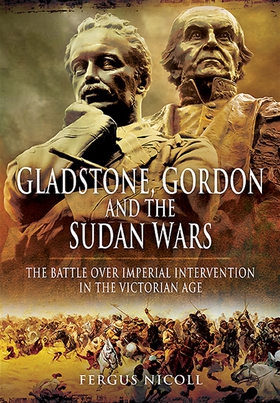
Lägg till önskelistan
Gladstone, Gordon and the Sudan Wars e-bok
Pris
115 kr
General Gordon’s death in Khartoum on 26 January 1885 – and the fall of the besieged city to the forces of the Mahdi – was a crucial episode in British imperial history. It was deeply controversial at the time, and it still is today. Gordon has routinely been depicted as the hero of the story, in contrast to Prime Minister Gladstone who is often portrayed as the villain of the piece, responsible for a ‘policy of drift’ in Sudan.
Fergus Nicoll’s radical rea...
E-Bok
115 kr
Pris
Förlag
Pen and Sword
Utgiven
23 Februari 2021
Längd
212 sidor
Genrer
Historia & Arkeologi, Fackböcker
Språk
English
Format
epub
Kopieringsskydd
Vattenmärkt
ISBN
9781473822535
General Gordon’s death in Khartoum on 26 January 1885 – and the fall of the besieged city to the forces of the Mahdi – was a crucial episode in British imperial history. It was deeply controversial at the time, and it still is today. Gordon has routinely been depicted as the hero of the story, in contrast to Prime Minister Gladstone who is often portrayed as the villain of the piece, responsible for a ‘policy of drift’ in Sudan.
Fergus Nicoll’s radical reappraisal, which is based on eyewitness accounts and previously unpublished archive material, refutes the conventional image of both men. Presenting an inside view of Gladstone’s thinking and decision-making, Nicoll gives the prime minister credit for his steadfast insistence that Britain should have minimal engagement in and zero responsibility for Sudan. Gordon, who succumbed to a lasting mania that skewed his decision-making and undermined his military capacity, is cast in a more sceptical light. This fascinating insight into British policy in Africa exposes the inner workings of government, the influence of the press and public opinion – and the power of a book to change a government.
Each stage in the rapid sequence of events is reconsidered – Gladstone’s steely determination to avoid involvement, Gordon’s partial evacuation of Khartoum, the siege, the despatch of the relief expedition that arrived too late, the abandonment of Sudan, and the subsequent political battle over responsibility. The personal cost to both men was great: Gordon lost his life and Gladstone saw his reputation gravely tarnished.




